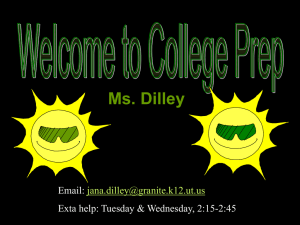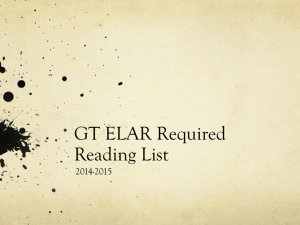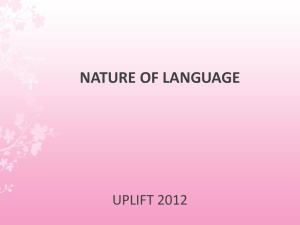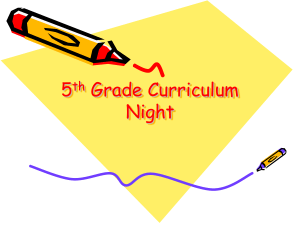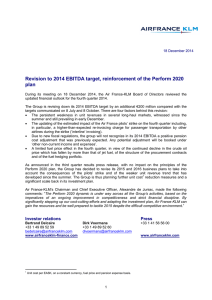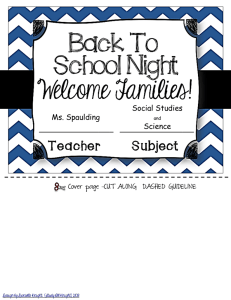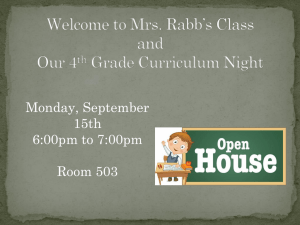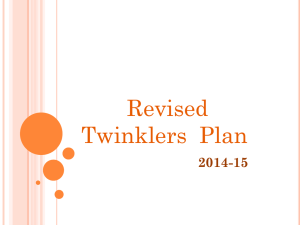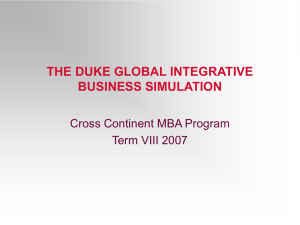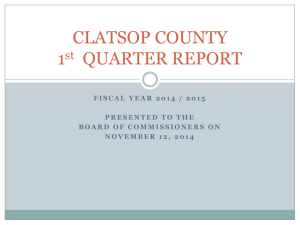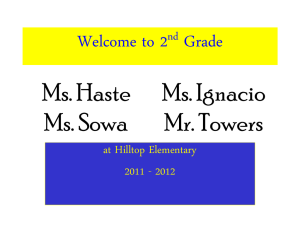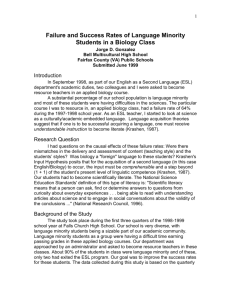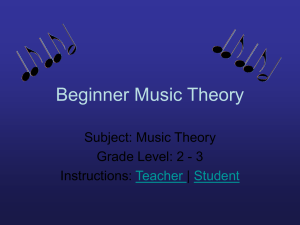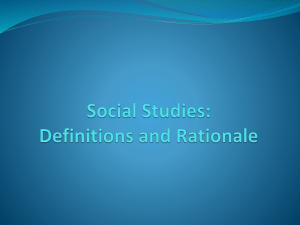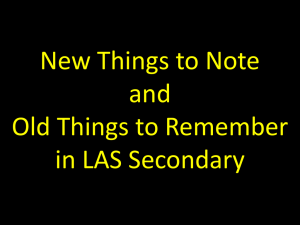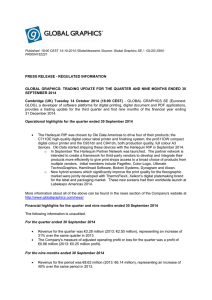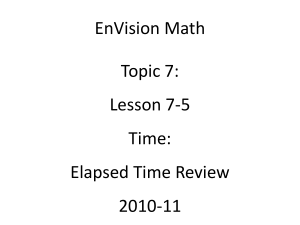Document 5434579
advertisement
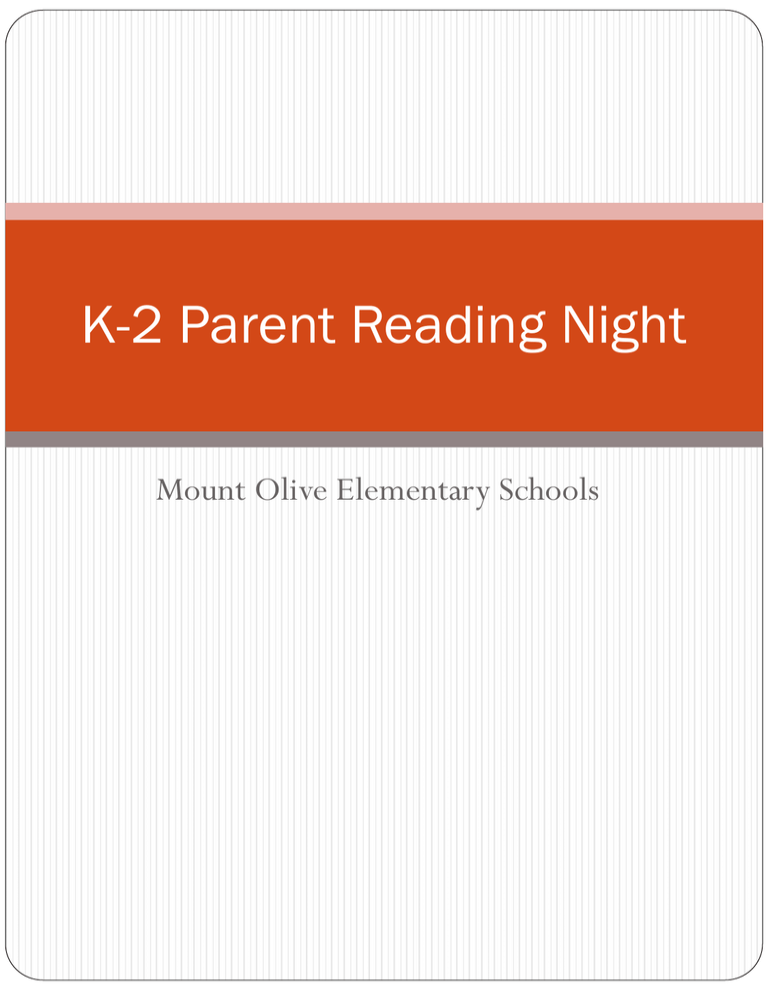
K-2 Parent Reading Night Mount Olive Elementary Schools Reading Level Targets Kindergarten First Quarter – Print Concepts or Reading Behaviors Second Quarter – B Third Quarter – C Fourth Quarter – D Reading Level Targets First Grade First Quarter – E Second Quarter – G Third Quarter – H Fourth Quarter – J Reading Level Targets Second Grade First Quarter – K Second Quarter – l Third Quarter – M Fourth Quarter – M or N Decoding Strategies dog or puppy dog or puppy Read ________ read The dog _______ at me. (barked) go – ing look – ing Comprehension Strategies Comprehension is asking questions about the text. But it is so much more………… Comprehension is asking questions about the story. It is knowing the characters, setting, problem, and solution. Making Predictions - Predicting what I think will happen next. Student says, I think the character will... or Maybe they will... Questioning to Understand - Asking questions about the book before, during, and after reading the book. (Parents and Students) Making connections with the book. This reminds me of another book.. or When I.... Using background knowledge - Using what I already know about things to understand the story. Determining Important Ideas - Understanding the main idea of the story and what the author is trying to tell you. Retelling the story - Going back through the book, page by page, and telling the most important details from each page. Using vocabulary and language from the story. (Not rereading the story.) Summarizing – Main Events in order. Should be brief. Inferring – Back Ground Knowledge + Clues from the text = Inference Predicting – What will happen next? Visualizing – Creating a picture in your mind. Text Features – Diagrams, Maps, Charts, etc. (Especially important in Non-Fiction) Questioning – Asking questions as they read. (I wonder….) Fixing Comprehension – Reread, Decoding Strategies, and understanding Vocabulary – discussion, create knew knowledge for unknown words “Hey brain, what do I know about __________?” What will happen next? ? ? ?? That reminds me of… What matters most? I want to remember… Main ideas and events in order 1 2 3 4 5 Before Reading As You Read After Reading Confused? Use your tools! WORD DECODING STRATEGIES This could mean… Backgrou Clues + nd from the Knowled Text ge =Inference I’m picturing… “I can imagine…” USE YOUR SENSES My new thinking is… I used to think ___ but now I think… Written Comprehension Beginning at level F students are required to respond to text that they read during benchmark assessments in written form, as well as orally. Students must read the questions and understand the questions on their own. This can be difficult for students.You can help by …… Using the question stem bookmarks and have your child respond in writing. Asking your child’s teacher for written question stems for their level? Writing about what your child is reading with your child. Creating a Home Reading Environment Print Rich Environment – newspapers, magazines, fiction and nonfiction books, catalogs, recipes, songbooks, tablets, songbooks, poetry, how to, informational, comics, internet, etc.. Comfortable and Relaxed Interactive Everybody Reads Be a Reading Role Model – fluency, reading strategies and understanding. Read aloud to you child Visit the local library and school library – Student Library Card – Child Chooses Value reading in your everyday world Activities Word/letter games like Pictionary, Scrabble, BINGO, and Boggle Play with alphabet letter cookie cutters or stamps Sight Word Practice Discuss the daily schedule Interact with magnetic letters Label photos of students, teachers, important school staff and class activities Explore a variety of books, magazines, books on tape, books on computer Complete daily communication notebooks Poetry (read, write, draw) Create a Book Cover New Reporter Puppet Show Cartoon Poster Commercial Model Mural Play/skit Song/Rap Trading Cards Map Mobile Letter Homework Frustration Should be easy to moderately challenging. No tears Relaxed Confidence Building Conversations - Comprehension will become more natural for your child when you spend time engaging your child in a conversation about the story. If your child is frustrated, the text is too difficult. Partner read with your child, echo read, or choral read with them. Then let the teacher know. Practice, Practice, Practice Parent Guide to Student Success – Gives an overview of the Common Core Standards for each grade. You have a copy for your child’s grade. www.ncpublicschools.org & www.learnnc.org Book Marks Websites –Visit Mount Olive’s Homepage for links http://www.mountolive.stokes.k12.nc.us/stu dents.html Utilize Apps, Virtual Libraries, etc. Thank you for coming!

